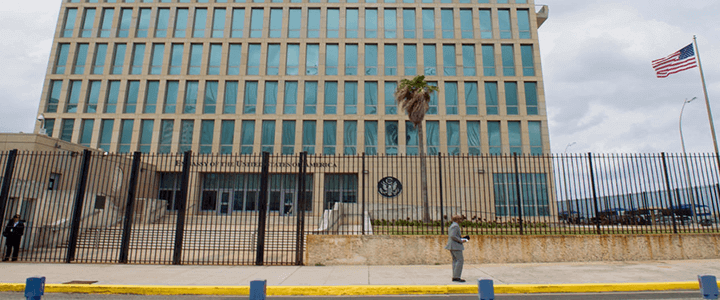News broke yesterday that back in September, the State Department awarded a sole-source contract for local guard services in Russia to Elite Security Holdings, a Russian company founded by a former KGB general and currently run by his son. Cue the tongue-clucking and finger-wagging.
The State Department says it “contacted more than three U.S.-based private security firms” to determine if they held the necessary licenses to operate in Russia, and if they wished to bid on the opportunity. That it found none should be no surprise. What U.S. company that relies on the Federal government for its living would risk doing business in Russia? After all, just obtaining the necessary licenses to do business as a security company in Russia likely involves numerous violations of the Foreign Corrupt Practices Act, which prohibits U.S. companies from paying bribes to foreign officials.
The sole-source award is unusual, but was necessary because the Russians kicked a bunch of our diplomats out of the country and State had to scramble to cover the security requirement. Otherwise, the contract is run-of-the-mill. The only reason this contract is making any news at all is the Russian connection. But not only is this development not a cause for alarm, it was entirely predictable, even inevitable.
Local guard forces: the lowest bidder always wins
The U.S. Marines who guard embassies are an outward symbol of American power, and can act as a deterrent to hostile actors, but they are, in reality, a last resort. To secure the perimeters of diplomatic outposts and perform routine tasks like screening visitors, the State Department awards contracts to private security service providers for local guard forces.
Not all Federal contracts are strictly “lowest bidder” awards. The Federal Acquisition Regulations allow the use of “best value,” where the contracting officer is permitted to balance cost with capability.
But in the case of local guard force contracts, Federal law (22 U.S.C. 4864) requires that, other than in Iraq, Afghanistan, and Pakistan, the State Department award these contracts on a “lowest price, technically acceptable” (LPTA) basis. This has two effects: first, it practically guarantees that the awardee is not the best company for the job, since quality service logically costs more; second, it all but ensures that the critical task of recruiting, equipping, training, and managing our diplomats’ first line of defense in the case of a terrorist or insurgent attack is out of the reach of American-owned and operated companies.
The law provides for a 10 percent price preference for American companies, but the effect is negligible; the foreign-owned companies who are winning State Department contracts often establish U.S. subsidiaries or enter into a joint venture with an American firm.
So by law, a company whose “technical approach” — the way they say they’ll get the job done — is marginal but still acceptable, and who bids $990,000, wins the contract over a company whose technical approach is superior but whose bid is $1,000,000.
Lowest bidder, poor quality, and increased oversight
In February 2012, the State Department’s Inspector General delivered a report to the Senate Committee on Foreign Relations that examined the use of LPTA contracts for local guard forces. The report recommended that Congress authorize (but not necessarily require) the use of Best Value awards for these contracts.
The report found that a majority of State Department regional security officers surveyed “strongly believed that their post would benefit from having the option to use best-value contracting for the guard services,” and “at some overseas posts that local guard contracts let under the current lowest-price award method had performance problems and an increased need for oversight from Department officials – a condition that may be alleviated by the use of the best-value method where price is not the overriding factor in awarding the contract.”
Furthermore, in at least one instance, the IG found that a security firm intentionally lost money on the U.S contract, because the prestige of having that contract brought it much more domestic business. Against this, U.S. companies simply cannot compete.
Despite this, Congress has not acted to change the law to give RSOs the flexibility to select the best company over the lowest-priced company.
The State Department operates more than 270 embassies, consulates, and other diplomatic missions around the globe, all of which face very real security threats. At the extreme end of the threat spectrum are incidents like the 2012 attack on the consulate in Benghazi, Libya, which claimed the life of Ambassador Chris Stevens. The local guard force, under the management of previously unknown British company, Blue Mountain Group, was poorly trained and inadequate to the task. At the first sign of trouble, they seem to have disappeared.
Despite all the furor surrounding Benghazi, the LPTA requirement remains on the books. If the law wasn’t changed for that, it won’t be changed because a shady Russian company is screening visitors to the U.S. embassy in Moscow.



